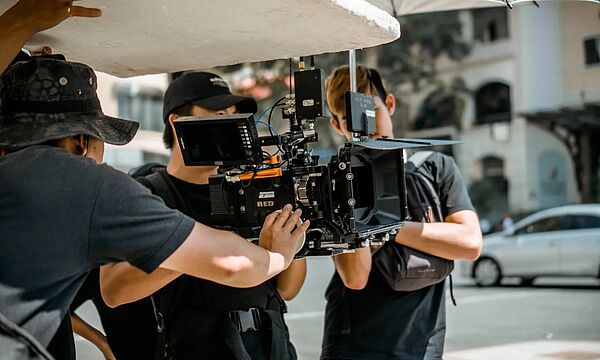South Africa’s Post-apartheid Co-productions: Current debates regarding the role of production environments for multicultural exchanges, skills development, and knowledge transfer
Conférence de Natalie Kowalik and Philippe Meers
- Natalie Kowalik holds a doctorate in Social Sciences, Communication Studies from the University of Antwerp, Belgium. Her PhD focused on South Africa’s post-apartheid film policy and the shifting discourses on film, national identity, and the cultural/creative industries. She is currently a research member of ViDi, the Visual and Digital Cultures Research Center in the Department of Communication Studies at the University of Antwerp. Her main research interests include film, media, and creative economies.
Area of expertise
My research focuses on contemporary film policy with particular emphasis on South Africa and Africa. This includes research on contemporary film industries and cultural and creative industries, public policy, and stakeholder engagement at national and transnational levels.
- Philippe Meers is Professor in Film and Media Studies at the University of Antwerp, Belgium, where he is deputy director of the Visual and Digital Cultures Research Center (ViDi) and director of the Center for Mexican Studies. He has published widely on historical and contemporary film cultures and audiences. With Richard Maltby and Daniel Biltereyst, he co-edited Explorations in New Cinema History: Approaches and Case Studies (2011), Audiences, Cinema and Modernity: New Perspectives on European Cinema History (2012) and The Routledge Companion to New Cinema History (2019). With Ifdal Elsaket and Daniel Biltereyst he co-edited Cinema in the Arab World: New Histories, New Approaches (2023).
Area of expertise
My research focuses on historical and contemporary film and media cultures and audiences in Belgium, Europe and Latin America. This entails historical research on film industries, cinemas, programming and audiences; research on contemporary young audiences and their opinions and uses of film, etc.
On 22 July 2023, during the annual Durban FilmMart, South Africa’s national film body, the National Film and Video Foundation together with the Nigerian Film Corporation unveiled the Co-Production Procedure and Practice Handbook to service the Nigeria-South Africa Audio-Visual Cooperation Agreement, signed towards the end of 2021. This follows on from several policy developments, whereby, the National Film and Video Foundation, published their drafted co-production treaty agreements with three African countries, i.e., Nigeria, Kenya, Algeria in 2021. Although South Africa already had ten existing co-production treaty agreements with various countries, the recently signed audio-visual agreements with Nigeria (2021) and Kenya (2022) have marked South Africa’s first entry into fostering official co-production treaty agreements with its fellow African countries.
The discourses surrounding the role co-productions play in South Africa’s film space emphasise the potential for skills transfer, knowledge exchange, job creation and economic development. Furthermore, co-productions play an important role in being able to appeal to other territories of the respective co-producing partner. However, the emphasis on film for export has led to arguments as to whether the export model is the best for South Africa’s cultural development (Treffry-Goatley, 2010).
Many countries look to co-productions to stimulate production and bring in capital, while others look to their neighbouring countries which share similarities, i.e., common language, cultural traditions, geographical location, ethnicity. Although Africa’s media landscapes have several challenges, e.g., piracy, lack of formal structures, industry stakeholders in South Africa have already started to engage with other African countries to develop productions, e.g., with Angola in the case of the crime action film Santana (Dos Santos & Roland, 2020); while South African government agencies, including the Eastern Cape Development Corporation, have also indicated their interest in utilizing the audio-visual cooperation agreement with Nigeria.
Framed within the field of film policy studies (Hill & Kawashima, 2016; Mingant & Tirtaine, 2017), and making use of both a stakeholder and interpretive policy analysis, this study combines information from in-depth interviews with over 50 policy actors and industry stakeholders with an extensive analysis of published material from the industry, commercial and government media. Drawing on Caldwell (2008) the study aims to establish the role of co-productions in South Africa as sites for multicultural exchanges, skills development, and knowledge transfer. Furthermore, it asks the question: Would more African collaborations foster and stimulate cultural development to fit South Africa’s post-apartheid cinema needs?
References:
Caldwell, J. T. (2008). Production Culture: Industrial Reflexivity and Critical Practice in Film and Television. Durham and London: Duke University Press.
Dos Santos, M. (Director), & Roland, C. (Director). (2020). Santana. [Motion Picture]. Angola and South Africa: Giant Sables Media Entertainment and ZenHQ Films
Hill, J., & Kawashima, N. (2016). Introduction: film policy in a globalised cultural economy. International Journal of Cultural Policy, 22(5), 667–672.
Mingant, N., & Tirtaine, C. (Eds). (2017). Reconceptualising Film Policies. New York: Routledge.
Treffry-Goatley, A. (2010). The representation and mediation of national identity in the production of post-apartheid South African cinema (PhD thesis, University of Cape Town).

